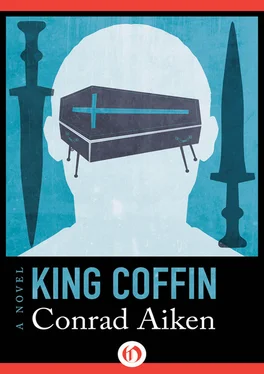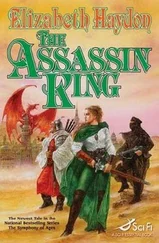They had been talking together again — and Toppan had told her that he looked ill.
What was more interesting, however, was the note of withdrawal in the letter, which was distinct. This too might be Toppan’s doing, but more likely it was Sandbach’s. Sandbach was beginning to struggle. He was saying to her — that madman Ammen. You must cut yourself off from that madman Ammen. The quarrel in front of the Fogg Museum might have been that — Sandbach had been urging her to drop him, he was frightened and angry, and he disapproved of Toppan’s influence because Toppan didn’t agree with him. That was why he had refused Toppan’s invitation to tea. And also, of course, he probably suspected Toppan of knowing more about the situation than he did himself. He suspected all three of them of keeping him at a distance, keeping him in the dark, he was struggling in a web of which the filaments were maddeningly invisible.… The whole thing was working beautifully.
But what should he say to Gerta?
He became aware that he had been listening to the radio which sounded from an open window, Frankie and Johnnie—“bring on your rubber-tired hearses, bring on your rubber-tired hacks”—the melancholy irony died behind him in a sardonic drawl as the car picked up speed, and in a moment he had passed the house in Reservoir Street and was heading for Concord Avenue. The Ford had gone, no one was in sight, but the cot and bags stood on the porch, and the door was wide open. It was tempting — the opportunity was certainly unusual — but on the other hand to turn back now might be a little risky: some prying neighbor, standing behind curtains, might notice it and think it peculiar, might remember seeing the Buick there before; or remember it later when he came again. Better not. And the day’s work was already good enough.
But what should he say to Gerta?
And need it be shaped in advance, or could it be allowed to shape itself, or to be shaped by her ?
As a matter of fact, the necessity wasn’t so much for saying anything as for appearing: the real need, for the moment, was that he should simply be seen , so that the weight of his character and purpose — above all his purpose — should again, and at this critical juncture, be deeply felt. The time had come for a subtle counter-balancing of Sandbach, a sly disturbance of the center of gravity. To do this, it would be sufficient, as it were, simply to cross the stage, to look hard at her for a few seconds, and then vanish. The bonds would be tightened, Sandbach’s work would begin all over again, the shadow on him would have deepened still further, and if in addition Toppan had fed her natural anxiety, so that she was concerned for him, or even had begun to feel sorry for him—
He laughed, sounded the claxon derisively, once, twice, three times. Sorry for him! And of course it was exactly what was happening. It had been apparent in his last interview with her, she had pressed the point about Kay, she had subsequently tried to discuss the subject with Toppan, and now it was more than ever apparent in her letter. He looked ill, he was not sleeping. There it was, plain as a pikestaff! Accordingly, she would take the initiative, she would be inquisitive, she would want to find out exactly where they stood, both with regard to each other and with regard to Sandbach, and this would render her — in the deepest sense — vulnerable. On this pattern, the scene could be allowed to shape itself. She would question — she would stand there questioning — and he would simply be . We ask and ask — thou smilest, and art still outtopping knowledge. The abyss will gaze into thee.
The details shaped themselves beneath his hands on the wheel, flew in parallels of bright speed, seethed with the wind through the cracks in the glass, rose before him in the grey shape of Belmont. If he got there first, he would leave the car at the edge of the road, in the usual place, would precede her to the familiar little hollow of rocks and grass and junipers, with its wall of cedars and birches, so that before she could see him she would hear him. But if she heard the shots, would she dare to approach?
That risk must be taken. If she heard him, and decided not to come—
There was no sign of her at the top of the hill, nor in the path that led to the abandoned racecourse, nor on the grass-grown racecourse itself, where he got out of the car. The gray stillness was profound, it was like the Sabbath, he took the revolver from the pouch in the car door, slipped it into his pocket, also the little red box of cartridges tied with string, then put two fingers to his teeth and gave a long whistle, whip-lashed at the end like a whip-poor-will. There was no answer, no echo from the coppice of white birches, he noticed the dandelions in the short grass at his feet, and it occurred to him that he could leave a note for her. He wrote on the back of Gerta’s letter: Quite safe to approach: firing the other way. Leaving this on the runningboard, with a pebble to hold it in place, he descended the short path of rocks and sprawling juniper which led to the hollow, lifting one elbow before his face as a protection against swinging branches. As he watched the last of the young birch leaves, bright green, slide across his blue sleeve, he heard Gerta’s voice before him, speaking levelly:
— I had an idea it would be safer to be here first.
— You needn’t have worried. I left a note for you on the car.
— Why the car? is that part of the plot?
— Of course. I thought Toppan had told you. And as a matter of fact, hadn’t he?
— As a matter of fact, he hadn’t.
Seated on the rock, her hands beside her, her foot swinging, she looked up at him with an air of challenge and mischief, her dark eyes narrowed but bright, a look which in other circumstances might have been disconcerting. The familiar blue cape was open, save at the throat, she was wearing the white Russian blouse, she was bare-headed, the dark hair turned away in wings from the calm forehead.
— Then I’ve no doubt he will.
— My dear Jasper, would you mind just explaining a little of all this?
— Must I? I thought everything had been made quite clear at our last meeting.
— I see. You assumed it would all go on .
— Why not?
— As I said in my letter, you appear to take a great deal for granted. Merely because in the past we’ve been very good friends—
— Am I right in saying that we came to an agreement? an agreement to co-operate? But I suppose, as I predicted, S has begun to influence you, you’re no longer to be trusted. You were unable to keep yourself separate from him!
She got up and walked away from him slowly, her hands holding tensely the dark edges of the cape. Over her shoulder she said, with an effect of measured lightness:
— I expected you to say that. I’ve been completely loyal. Sandbach is certainly distressed and angry about it, and of course very much mystified, nor can you blame him, he’s not content to let things just stand as they are, he wants to know what is happening.
She turned back towards him, stood still in the grass, the cape folded across her breast, her arms akimbo beneath it. Across the little interval of bright grass and dandelions she continued:
— Co-operation! What am I supposed to do when you go away and stay away? It’s all very well!
He took out the revolver, held it flat on the flat of his hand, weighed it appreciatively with downward gaze.
— You were supposed to wait, to be trusted. You know that.
— Jasper, I was —
— You’ve doubted, you’ve drawn away, your letter makes that clear! We’ll discuss it later — in the meantime do you mind if I try this out? A couple of rounds, just to see if it’s working. Two years ago at Capri—
Читать дальше












